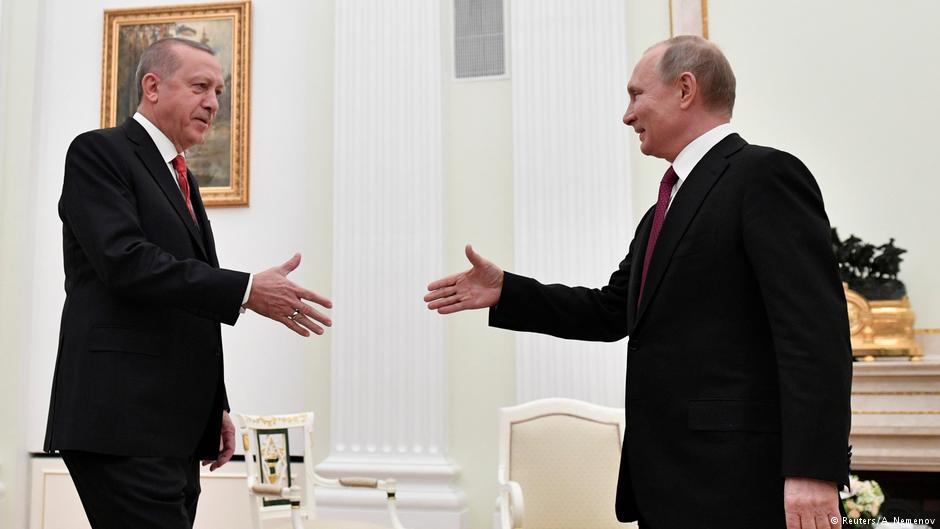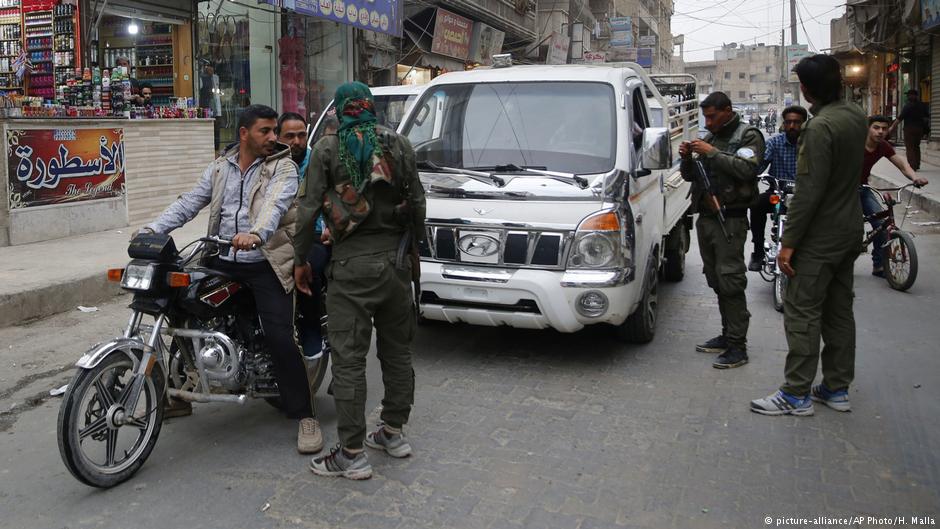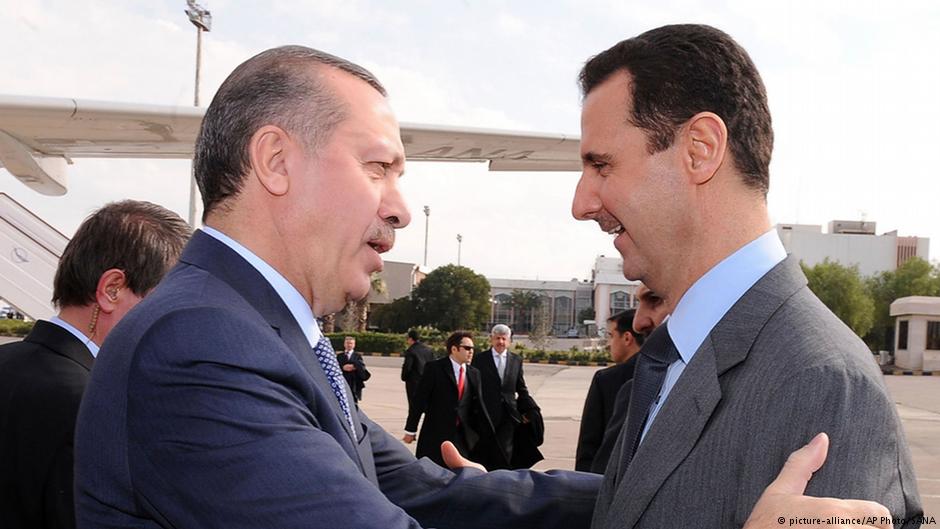Getting Erdogan on board

When Russian President Vladimir Putin was asked about the U.S.' suggestion of a safe zone east of the Euphrates River, in response to which Turkey has repeatedly vowed to launch a large-scale military operation, he said such a move would not be legitimate. Instead, he rolled out an agreement signed in 1998 between Damascus and Ankara to reassure Turkey that Russia had understood its security concerns, while protecting the latter’s interests in blocking the U.S. from creating a permanent presence there.
In a meeting on 23 January with his Turkish counterpart Recep Tayyip Erdogan in Moscow, Putin produced the Adana accord, named after the southern Turkish city where the pact was sealed. The aim at the end of the nineties was to avert the threat of Turkey waging war on Syria for its hosting of Abdullah Ocalan, the now jailed leader of the Kurdistan Workers’ Party (PKK), designated as a terrorist organisation by Turkey, the EU and the United States.
The deal forced Ocalan to leave Syria, only to be subsequently captured in Kenya. He is now serving an aggravated life sentence in a high-security prison on the remote Imrali Island in the Marmara Sea for leading a massive insurgency against the Turkish state.

The Adana agreement envisaged close and strong co-operation, the appointment of special representatives and high-level contact between the respective militaries in the fight against terrorism. It also, importantly, stressed that the common enemy would not only be the PKK, but any name it might take in the future or any affiliate.
The description included in the agreement explains how Turkey is now able to view the People’s Protection Units (YPG), which the U.S. has long been supporting in the fight against IS, as the PKK’s Syrian offshoot. The YPG controls almost one-third of Syria in the form of an autonomous administration along the Turkish border, which Turkey calls the "corridor of terror".
Restoring ties with Damascus?
Since his meeting with Putin, Erdogan has said the agreement provides the answer to those asking what Turkey is doing in Syria. But he has strictly rejected opposition claims that Putin revived the deal in a bid to restore broken ties between Turkey and Syria, the latter being the only means of quelling Ankara’s security concerns. On the flight back from his Moscow meeting, Erdogan told journalists aboard the plane with him that Turkey would not have any top-level contact with "someone who is the reason behind the deaths of more than one million people and the displacement of millions of others," referring to Syrian leader Bashar al-Assad.
Unal Cevikoz, deputy chairman of the main opposition Republican People’s Party (CHP) and a retired ambassador, told Qantara that Putin’s reference to the Adana accord to address Ankara’s security concerns is a legitimate and logical suggestion.
"Russia wants Ankara and Damascus to enter dialogue, which will become inevitable sooner or later. Turkey has to accept a fact that has already been acknowledged by the world: Assad will remain in power. But Erdogan believes that accepting that fact will mean a step back, something he has been refraining to do. Such stubbornness is incompatible with the necessities of realpolitik," Cevikoz said.
At the time, the Adana deal did not only prevent a war between Ankara and Damascus, it improved ties to such an extent that the Erdogan and Assad families even holidayed together.
Adana does not give Turkey the right to act unilaterally
The deal remained in place until the Syrian uprisings erupted in 2011, Ismail Hakki Pekin, a retired lieutenant general who formerly headed the intelligence department of the General Staff, told Qantara. He stressed that, contrary to what Erdogan is implying, the Adana agreement does not give Turkey the right to act unilaterally.
"The Adana agreement prepares the ground for co-operation, not unilateral action. I visited Syria every six months when I was head of the military’s intelligence service between 2007 and 2011. They extradited all PKK members, shut down their camps and eradicated their financial sources. The last meeting between Turkey and Syria was in January 2011 during my time. I went to Damascus within the framework of the agreement. They were supposed to come in August, but did not under the circumstances," he said.Pekin went on to reveal that two days before Putin brought up the Adana accord, he spoke to a Russian source who suggested "Turkey enters from the north, the Syrian regime enters from the south; the area is swept and after order is restored, Turkey withdraws."
Pekin argued that this is what Moscow wants and the Adana agreement prepares the ground for it. However, he added that if Turkey wants this solution to work, it would have to give up its policy of ousting the Assad regime and supporting the Free Syrian Army, which is considered a terrorist structure by Damascus.
Aiming to keep everybody happy
Oytun Orhan, the co-ordinator of Syria studies at the Ankara-based Centre for Middle Eastern Studies (ORSAM) think tank, is convinced that by reminding Ankara of the agreement, Putin is also trying to provide a counterbalance to the safe zone proposed by the U.S., the latter to come into effect following its withdrawal from Syria.

"Both the U.S. and Russia want to keep Turkey on side, however neither of them want to lose the YPG either," he added. "Washington is telling Turkey: ʹI understand your security concerns so I am suggesting a safe zone which will be a buffer between you and the YPG.ʹ At the same time, it is also telling the YPG not to be along the Turkish border, offering the south of the security zone instead."
According to Orhan, Moscow has – in referencing the Adana agreement – made its own offer based on the security co-operation between Ankara and the Syrian regime. Orhan also pointed out, however, that when Putin brought up the Adana deal, he was also keen to emphasise that Moscow was trying to encourage the regime to establish dialogue with Kurds to ensure the unity of Syria. This could be a message to the YPG that Moscow is willing to accept preserving some of the Kurdish gains in Syria.
Journalist Gurkan Zengin, the author of several books on Turkish foreign policy, argues moreover that Ankara has good reason not to trust the U.S., with which it is still negotiating a final offer.
"Turkey also has reason not to trust the Syrian regime. As Erdogan has underlined several times, Turkey is not prepared to enter into high-level talks with Damascus. Ankara could, however, maintain low-level contact for the time being – at least until it becomes clear what exactly is being offered by both the U.S. and Moscow. Meanwhile, it seems likely Ankara will try to ensure that it at least maintains some room for manoeuvre," he told Qantara and added:
"That said, it would come as no surprise were Ankara to act unilaterally. As Erdogan frequently says ʹwe might show up one night out of the blueʹ."
Ayse Karabat
© Qantara.de 2019
